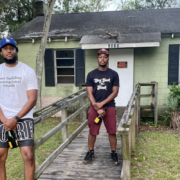They’re Reimagining Black Wealth!
— BOTWC STAFF, BECAUSE OF THEM WE CAN
In 2013, Timothy Webb Jr. graduated from the University of South Carolina ready to use his degree in information technology to help secure data, and now he’s added securing land to his plate.
Last year, Webb founded More Than a 9 to 5, a lifestyle brand bridging the gap between entrepreneurship and traditional careers because he said he believes people can have the best of both worlds. Recently, he and his Kappa Alpha Psi fraternity brother, Rashae Bey, purchased almost two acres of land in Webb’s hometown of Columbia, S.C., and have a total of 26 rental units between South Carolina and Virginia.
— Credits
Featured Image, BOTWC
Full article @ Because of Them We Can
— Related
Historically black colleges and universities (HBCUs) are institutions of higher education in the United States that were established before the Civil Rights Act of 1964 with the intention of primarily serving the African-American community. Most of these institutions were founded in the years after the American Civil War and are concentrated in the Southern United States. During the period of segregation in the United States prior to the Civil Rights Act, the overwhelming majority of higher education institutions were predominantly white and completely disqualified or limited African-American enrollment. For a century after the end of slavery in the United States in 1865, most colleges and universities in the Southern United States prohibited all African Americans from attending, while institutions in other parts of the country regularly employed quotas to limit admissions of blacks.
There are 101 HBCUs in the United States, including both public and private institutions (of 121 institutions that existed during the 1930s). Of these remaining HBCU institutions in the United States, 27 offer doctoral programs, 52 offer master’s programs, 83 offer bachelor’s degree programs, and 38 offer associate degrees.
Source – Historically Black Colleges and Universities – HBCU (Updated: 20 October 2020) Wikipedia. Available at https://en.wikipedia.org/wiki/Historically_black_colleges_and_universities, (Accessed: 20 October 2020)

